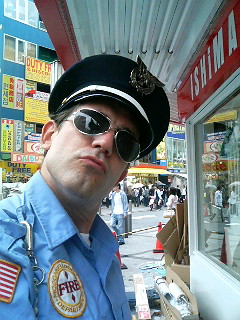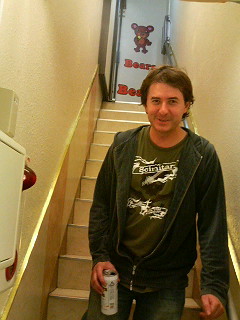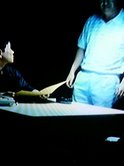WE have all heard the cliche of the Five Stages of Grief which people pass through in times of turmoil, and I guess we have all experienced the process in some way, through the death of a loved one or the end of a relationship, etc. It always sounded a plausible theory to me, but until I had been arrested and held in a detention center, I had never felt the process so acutely -- LIVED THE PROCESS SO ACUTELY. Looking back on it, I seemed so naive on my first days in prison, that I was obviously in a state of denial (stage one of the Five Stages of Grief according to the accepted wisdom.) Of course this was partly ignorance: I didn't know how the legal system worked in Japan, and although I dimly recalled reading in the Lonely Planet guide to Japan (inside a toasty warm train in the Japanese Alps near Niigata one winter's day, the snow bucketing down outside) that one shouldn't get arrested in Japan because the police can hold you up to 23 days without laying a single charge, I never expected such a fate to befall me. That's denial for you! Even at the exact moment I was arrested, as I stood in the square in Shimokitazawa (just up from the train station) with the guy from the karaoke parlor clutching my wrist, and the cop getting out of his car with his handcuffs at the ready, I never thought I was in that much trouble. After all, we had done was run out of the karaoke parlor without paying the bill. In any case, the bill was only about 8000 Yen (less than $80), and it wasn't my idea to run out to begin with. I hadn't really committed a crime, unless you considered stupidity a crime (in which case I am a career criminal!) I imagined that as soon as the cops started talking to me, they would realize what a nice guy I was and warm to me (that's the usual impression I make on others.) Strangely, this cop hadn't pegged me as a nice guy right from the start, and was in fact acting surly with me. I had to take the initiative and tell him: "I am a good person," but he didn't seem to believe me. He just threw me into the back of his squad car, and then raced me sirens blaring the short distance to the police station. (But why put the sirens on and drive so fast when he had already got me? He had already caught me; I had cuffs on and was in no position to do him any injury). On the way to the station we passed a couple of other squad cars racing about with their sirens on, looking for my accomplices Garnet and Cristal Meth who managed to escape, and Menace who did not.
My stubborn denial of the crisis I was facing continued at the station. In fact, I was more worried about how I was going to get through my teaching jobs later in the day with no sleep (after a weekend of no sleep and a fortnight of moving house, and about a bag of clothes and books and stuff which I had to pick up from the school that I work for, than I was about what kind of trouble I was in with the police.) I was irritated they were taking so long to question me, and kept wondering when they were going to let me go. My boss had been bugging me to pick up that bag which I had dumped at his school en route to my new house in east Tokyo, saying that because it was so big and bulky, it was getting in the way (it was jama, as he told me before screaming, in a weird phone call the previous night.) If I had known then that I would be in police custody for the next 16 days, and that moving a bag was the least of my problems, I probably would have died of shock. Which suggests that denial has an evolutionary function -- sometimes sticking your head in the sand ostrich style is good for your nervous and emotional health. In any case, I expected to be out of the police station and back on the street within hours. I was soon to learn, however, just how slow the wheels of Japanese justice turn. Oh so excrutiating slow.

Potential bad boy
on the streets of Akihabara |
In my naivete and denial I had decided the best thing to do was just 'fess up and explain what happened, rather than talk to a lawyer first (now I realize this was a big mistake, and I can't stress this enough to potential foreign arrestees in Japan -- if you are arrested, don't tell the cops shit until you have spoken to your lawyer first! Even if your lawyer takes a couple of days to show up.) In my innocence I thought that once the police had all the details they needed, they would let us go. As time went by, I grew irritated by how long all this questioning business was taking. I lost track of how many officers I actually spoke to. One would come into the interrogation room, fire some questions at me, and I would tell them the story of our escape from the karaoke parlor, the same story I had told the 10 previous cops. After five to 10 minutes they would go out an another guy would come in, perhaps a gentler, more sympathetic detective this time around. In my innocence and naivete I thought: "Why do these guys keep playing tag team like this? Are they that busy, that they continually get called away from their job of interviewing me?" I didn't know it at the time, but I was having my introduction to the Good Cop/Bad Cop routine. As Wikipedia reports: "Good Cop/Bad Cop, known in British military circles as Mutt and Jeff (from an American newspaper comic strip of that name) and also called joint questioning and friend and foe[1], is a psychological tactic, used for interrogation.
"It involves a team of two interrogators (eds. note: in my case, there were two whole teams of good cops and bad cops playing tag team for my hide!) who take apparently opposing approaches to the subject. The interrogators may interview the subject alternately or may confront the subject at the same time.
"The 'Bad Cop' takes an aggressive, negative stance towards the subject, making blatant accusations, derogatory comments, threats, and in general creating antipathy between the subject and himself. This sets the stage for the 'Good Cop' to act sympathetically: appearing supportive, understanding, in general showing sympathy for the subject. The good cop will also defend the subject from the bad cop. The subject may feel he can cooperate with the good cop out of trust and/or fear of the bad cop. He may then seek protection by and trust the good cop and tell him the needed information.
"The technique is easily recognised by those familiar with it, but it remains useful against subjects who are young, frightened, or naive. Experienced interrogators assess the subject's level of intelligence and experience with the technique prior to its application, as the technique is often seen as offensive and insulting to those who recognise it, who may thus refuse to cooperate outright."

Crime Scene Revisited
on the Stairs of Bears |
So, I was getting the Good Cop/Bad Cop routine, and I was basically just confessing blabbing everything, like a clubber on Ecstasy. The problem was, while I was acting all nice and vulnerable, a couple of interrigation rooms down, but still within hearing range, my partner Maniac High was taking an exactly contradictory tact. In a sense, just as the Tokyo police were playing Good Cop/Bad Cop, Maniac and I were playing Nice Guy/Bad Boy. In fact, truth be told, Maniac High was acting, well, like a maniac. Like a wild cornered cat, lashing out with his fluent Japanese, to assert his rights over the police, and establish himself as the Alpha Male. The scene from Goodfellows... An hour or so after my interrogation began, I heard him being dragged in. "You can't hold/arrest me, I am innocent man!" was what he was basically saying, in indignant Japanese, at the very same time I was gently admitting our guilt. Looking back on it, I can see the disconnect -- the contradiction in our behaviours, which must have puzzled the cops. Puzzled them enough to keep us locked up for 16 days, while they subjected us to questioning after questioning. As Menace shouted and screamed, one of the older cops interviewing me said softly to himself: "Urusai!" ("That guy's annoying/noisy!") I was just chuffed I wasn't in this hard cold place alone. When it became clear that I would have to stay overnight in the cells upstairs, I initially thought: "Cool, Menace and I can hang out for a while and talk about Ninjitsu and shit." But of course that wasn't going to happen -- prison isn't Club Med, and lockup is not a good social forum no matter how hard you try!
I spent my first evening lying on the floor staring at the wall which was all white, and staring at the fluorescent lights on the ceiling, three of them white, and one of them strangely yellow, and listening to my cellmates talk about the boom of the Chinese economy ("China! China! China!" a Sri Lankan guy said to Ichiban (his Chinese counterpart)... they had both been in the cell a couple of weeks and I kind of felt like I was intruding on their turf. The Chinese dude had bad breath. Little did I know, at the time, that I would soon own that cell, and be instructing the newly arrested how to adjust to the routine there. I had spent the evening (naively) trying to sleep, and at 8.30pm bedding was made available, and I had my chance to escape. I felt sure they were going to let us go the next day. Little did I know, the next day was to be the Day from Hell.
|
|
PRISON JAPAN... PRISON PLANET.
Contact the author Rob Sullivan at coderot@gmail.com. All comments will be published at the bottom of this page.
Anticopyright November 2007.
|
|







 ::
:: 